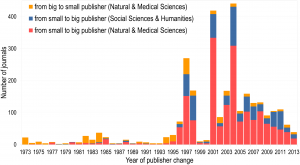Interested in an OA journal but not sure of its quality?
Erstwhile Otago colleague, now of the University of Canterbury, Anton Angelo has published a useful checklist to help determine the quality of an OA journal. Note that this is not to check the journal’s contribution to the discipline but rather its publishing and editorial practices.
(Copyright nerd note: I could just copy Anton’s post here, as he uses a CC BY licence, but linking to his page is good ‘internet etiquette’ in that he will see the use of his material if you go to his site.)



